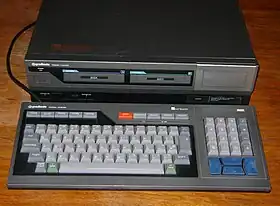Gradiente Expert
The Expert (or Expert XP-800), made by Gradiente Eletrônica (to date best known as a game console and Hi-Fi equipment company) was the second and last MSX home computer launched in the Brazilian market, in the mid-1980s.[1]
 | |
| Also known as | Expert XP-800 |
|---|---|
| Manufacturer | Gradiente Eletrônica |
| Type | home computer |
| Release date | December 1985 |
| Discontinued | 1990 |
| Operating system | MSX BASIC, MSX-DOS, CP/M |
| CPU | Zilog Z80A @ 3.58 MHz |
| Memory | 64 KB–4096 KB (max.) |
| Removable storage | Cassette tape, cartridges, floppy discs |
| Graphics | TMS9918 |
| Sound | AY-3-8910 |
| Backward compatibility | MSX |
| Successor | Expert GPC-1 |
It was presented to the public at the 5th International Computing Fair, nicknamed "Informatica '85".[2] The event took place at Anhembi Convention Center in the city of São Paulo from September 23 to 29, 1985.[3] At the announcement, the computer was priced 65 ORTN s.[4]
Its market release date was 1 December 1985, one week after Epcom's Hotbit, just in time for 1985's Christmas and with a massive media campaign on magazines, newspapers and TV. In the newspapers ads the initial offer price was Cr$ 4,640,000, or US$ 470 by the value at the time,[5] or US$ 1,165 by the end of 2021.
The machine was a clone of the National CF-3000, with a computer case resembling a stereo system, a detached keyboard with a proprietary connector, no caps lock LED and no reset key,[1] although the soft-reset could be achieved by pushing in either of the cartridge slot covers.[6][7]
The Expert XP-800 was followed by the Expert GPC-1 ("Gradiente Personal Computer") in 1987, and by Expert Plus and Expert DD Plus (a system with a built-in 720 KB 31⁄2" floppy disk drive) in 1989.[8]
The Expert users waited for an MSX2 machine, but Gradiente never produced it[8] and discontinued the MSX line in 1990.
Versions XP-800/GPC-1
The two first versions had a graphite case and socketed chips, which caused a chronic problem: when the machine heated, the chips frequently pulled out and the system "froze". Also, the GPC-1, released in 1987, had a ROM slightly modified to solve an ASCII table compatibility issue with the other popular Brazilian MSX, Sharp's Hotbit.
Versions Plus/DD Plus
The last two versions had a black case and the problematic socketed chips were replaced by an ASIC. Nevertheless, the RAM was mapped to a secondary slot and, although it was straight by the MSX standards, caused a lot of crashes with programs who searched for memory in the wrong place. It did not contribute for the popularity of any of the Plus versions.[8]
These machines used the MSX-Engine T7937A instead of the Z80A CPU of previous models.
Technical specifications
| CPU | Zilog Z80A (XP-800 & GPC-1) @ 3.58 MHz MSX-Engine T7937A (Plus & DD Plus) @ 3.58 MHz |
| VDP | TMS9918 |
| RAM | 64 KB |
| VRAM | 16 KB |
| ROM | 32 KB |
| Keyboard | mechanic, 89 keys (with 4 cursor keys), number pad |
| Display | text: 40×24 rows; graphics: 256×192 pixels, 16 colours, 32 sprites |
| Sound | General Instrument AY-3-8910 (PSG), 3 voices, white noise |
| Ports | 2 joystick connectors, TV out, RGB monitor out, sound out, tape recorder connector, parallel port, 2 cartridge slots |
| Storage | tape recorder (1200/2400 bit/s) or one or two external floppy drives (51⁄4", 360 KB or 31⁄2", 720 KB) |
Peripherals
- DR-1 ("data-corder"): tape recorder
- JS-1: joystick
- MBW-12: 12" green CRT monochrome monitor
- TA-1: TV adapter
- TM-1: 1200/75 bit/s modem with a RS-232C port
Notes
- "Gradiente Expert XP-800". www.old-computers.com. Retrieved 2023-05-20.
- "5ª Sucesu e 18º Cong. Nacional da Informática". Museu de Eventos - Anhembi (in Portuguese). 2015-05-18. Retrieved 2023-05-20.
- "Uma Vitrine Renovada" (PDF). VEJA (in Portuguese). No. 891. October 2, 1985. pp. 88, 89.
- "Informática 85: o que há de novo no setor" (PDF). Micro Sistemas (in Portuguese). September 1985. p. 36.
- "BRENO ROSSI shop advertising". O Estado de S. Paulo (in Portuguese). No. 33.987. December 15, 1985. p. 24.
- "Gradiente Expert XP-800". MSX Resource Center. March 8, 2023.
- "Expert". Museu da Computação e Informática - MCI (in Portuguese). 2004.
- "GRADIENTE Expert Plus". OLD-COMPUTERS.COM.